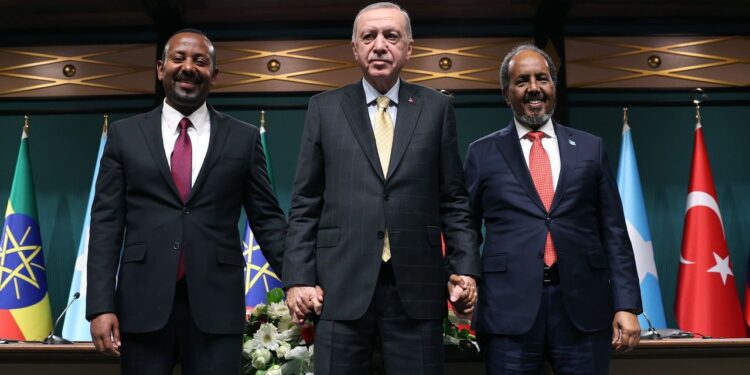However there are causes to be sceptical

For months a spat between Somalia and Ethiopia had been creeping in the direction of a disaster. In June Somalia threatened to expel all of Ethiopia’s troops from its territory, the place they’ve lengthy spearheaded the regional combat towards al-Shabab, a jihadist group. By October Somalia had shaped a army alliance with Egypt and Eritrea, Ethiopia’s bitterest foes, as Ethiopia’s military chief mused brazenly about arming teams hostile to the Somali authorities. Many feared the tensions might set off proxy wars and attract different powers within the neighborhood or create a safety vacuum in Somalia that al-Shabab may exploit.
Maybe they needn’t have nervous. In a shock announcement on December eleventh Ethiopia and Somalia appeared to make up. After negotiations in Ankara, brokered by Turkey, a joint declaration was signed by Abiy Ahmed, Ethiopia’s prime minister, and Hassan Sheikh Mohamud, Somalia’s president, agreeing to “depart behind variations and contentious points”. Recep Tayyip Erdogan, Turkey’s president, referred to as it a “historic reconciliation”. However there are causes to be sceptical.
On the coronary heart of the disaster is a memorandum of understanding (mou) signed on January 1st between Ethiopia and Somaliland, a self-governing statelet in northern Somalia. Below that settlement Ethiopia had supplied to turn into the primary nation to recognise the breakaway republic, in return for a long-term lease of a strip of its shoreline. This enraged Somalia, which considers Somaliland a renegade province and thus regarded the mou as a violation of its sovereignty.
Based on the joint declaration, Ethiopia will now search “entry to and from the ocean, beneath the sovereign authority of the Federal Republic of Somalia”. It has additionally agreed to respect Somalia’s “territorial integrity”. Somalia argues that this suggests the top of the mou. It can present Ethiopia with an outlet to the ocean for commerce; in return, Ethiopia has rescinded its provide to recognise Somaliland. “The mou is retracted,” says an official in Somalia.
Not everybody agrees. The vaguely worded declaration doesn’t point out the mou and Ethiopia has not confirmed it has cancelled it. Somaliland, the opposite get together to the mou, has greeted the information from Ankara with a shrug. Senior Somaliland officers say they’ve heard nothing from Ethiopia to recommend that the deal is off the desk.
Some consultants suspect that Mr Abiy remains to be dedicated to the mou and is solely taking part in for time. Below President Joe Biden each Ethiopia and Somaliland have been beneath heavy stress from America to kill the deal. However each count on Donald Trump’s administration to be extra accommodating. “From what I perceive, Abiy will not be deterred by worldwide stress, and is decided to pursue the mou by any means needed,” says Abel Abate Demissie, an Ethiopia-based analyst for Chatham Home, a British think-tank.
There’s a darker chance. Mr Abiy will not be happy with sea entry for commerce, as promised by the cope with Somalia. What he might actually need is a naval base. The mouwould have allowed him to construct one on Somaliland’s coast. An alternative choice could be someway to take again Assab or Massawa, Eritrea’s Pink Sea ports, over which Ethiopia misplaced management when Eritrea seceded in 1993.
Simply over a yr in the past, Mr Abiy urged that Ethiopia might attempt to take the Eritrean ports again by pressure. His language was subsequently toned down. However just lately the concept of reclaiming Assab has resurfaced on Ethiopia’s tightly managed state media. Final week it was urged that ceding the port to Eritrea had been unconstitutional and that Ethiopia was being “suffocated” in consequence. Add different ominous indicators that the 2 nations are making ready for a battle, and the outlook appears bleak. “The mou was simply an appetiser,” says an observer. “Assab is the primary meal.”
Supply: The Economist









